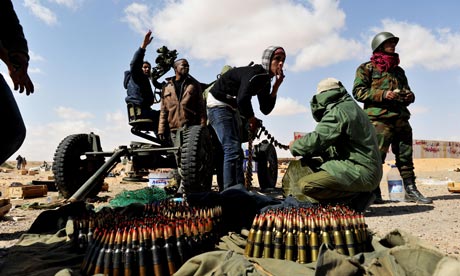UN paves way for no-fly zone as Nato steps up surveillance of Libya
![]()
Nato introduces 24-hour air and sea monitoring as west prepares to act to protect Libyan citizens from Gaddafi’s forces
Julian Borger, Richard Norton-Taylor and Nicholas Watt

Libyan rebel fighters load ammunition into an anti-aircraft machine-gun as airforce fighter jets fly overhead at Ras Lanuf, Libya Photograph: Roberto Schmidt/AFP/Getty Images
Cameron outlined his conversation with Obama when he appeared on The One Show on BBC1 at 7pm. “We have got to prepare for what we might have to do if he [Gaddafi] goes on brutalising his own people,” he said.
“I had a phone call with President Obama this afternoon to talk about the planning we have to do in case this continues and in case he does terrible things to his own people. I don’t think we can stand aside and let that happen.”
A Downing Street spokesman said the president and the prime minister had had a detailed conversation about military and diplomatic options if Gaddafi ignores international calls to stand down.
The spokesman said: “The prime minister and the president agreed to press forward with planning, including at NATO, on the full spectrum of possible responses, including surveillance, humanitarian assistance, enforcement of the arms embargo, and a no fly zone. They committed to close co-ordination on next steps.”
The strong support from the White House for detailed military planning will come as a relief to Cameron, who has faced criticism for a bumbling response to the Libyan crisis. Last week Robert Gates, the US defence secretary, criticised “loose talk” over a no-fly zone.
Hillary Clinton, the US secretary of state, last night cautioned that a no-fly zone would need clear approval by the UN security council and warned of the dangers if the west took charge of any military operation.
Clinton told Sky News: “We think it’s important that the United Nations make this decision, not the United States, and so far the United Nations has not done that.
“I think it’s very important that this not be a US-led effort, because this comes from the people of Libya themselves, this doesn’t come from the outside, this doesn’t come from, you know, some western power, or some Gulf country saying, ‘this is what you should do, this is how you should live’.”
Nato has launched 24-hour air and sea surveillance of Libya as a possible precursor to a no-fly zone, amid signs of growing Arab support for western military intervention to stop the bombing of civilians.
British and French diplomats at the UN headquarters in New York have completed a draft resolution authorising the creation of a no-fly zone which could be put before the security council within hours if aerial bombing by pro-Gaddafi forces causes mass civilian casualties.
A western diplomat said: “It would require a clear trigger for a resolution to go forward.” In such an event, there would be pressure on Russia and China not to use their vetoes. Western officials believe support for a no-fly zone from the Islamic world, as well as from the Libyan opposition and diplomats at the UN, would put Moscow and Beijing on the defensive.
The Gulf Co-operation Council, the Organisation of the Islamic Conference and the secretary general of the Arab League have called for the protection of Libyan civilians while rejecting the intervention of western ground troops. Turkey, the most reluctant Nato member state, has relaxed its opposition and allowed contingency planning to go ahead.
The decision to step up air and sea monitoring was taken on Monday by the North Atlantic Council, a meeting of ambassadors from Nato’s 28 member states.
Early-warning Awacs aircraft already patrolling the Mediterranean region as part of a longstanding Nato counter-terrorist operation, Active Endeavour, will maintain a 24-hour air presence instead of just 10, and focus on the Libyan coast. Nato naval vessels taking part in Active Endeavour, meant to stop the infiltration of terrorists into southern Europe, are being sent to the Libyan coast with the aims of increasing surveillance and enforcing the arms embargo.
Two US marine assault ships, the USS Kearsarge and the USS Ponce, both with Harrier jump-jets aboard, are also approaching the Libyan coast.
Officials said the intelligence gained from the air and sea monitoring would inform the debate within Nato. They said some members were far from convinced on the need for Nato involvement in an Arab civil conflict, and there was no appetite for action without a UN mandate.
Robert Gates, the US defence secretary, is a sceptic on the effectiveness of a no-fly zone and is expected to argue for a cautious approach at the Nato meeting on Thursday. His scepticism reflects reluctance on the part of the armed service chiefs.
Gates has argued that any no-fly zone would involve preliminary bombing of Libyan air defences. Douglas Barrie, an aerospace analyst at the International Institute for Strategic Studies, has denied this.
“There’s no hard-and-fast rule in the establishment of a no-fly zone that you have to go in and take out all of your opponents air defences,” Barrie said. “You say ‘this is a no-fly zone and we don’t want you to fly, and if you adhere to that everything is going to be fine, but if you fire at us then we will take retaliatory action’.”
Related Articles
The Triumph of Austerity
![]()
Recovery Recedes, Convulsion Looms The dominant mood in liberal economic circles as 2010 drew to a close, in contrast to
Venezuela: Despite the crisis, Chavez’s legacy endures
![]()
When compared with the rest of the region, Venezuelans have the cheapest electricity, the greatest percentage of household connectivity and the highest per capita consumption, surpassing more industrialised countries such as Brazil
Justice delayed 30 years in Guatemala
![]()
Over 440 men, women and children were massacred to make way for the Chixoy Dam – a World Bank and



